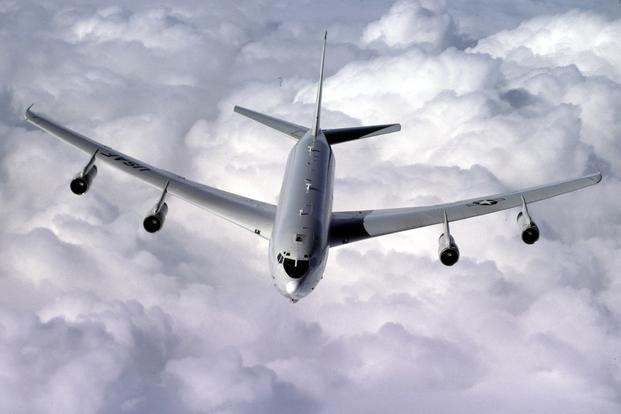A key lawmaker who has long backed the U.S. Air Force's E-8C JSTARS aircraft program says he understands why the service wants to shelve the in-demand aircraft's replacement in favor of a sensor system alternative.
"I do agree that wasting money on trying to [recapitalize] this plane that's not going to have access into denied airspace doesn't make sense," Sen. David Perdue, a Republican from Georgia, said Tuesday.
During a breakfast briefing with reporters in Washington, D.C., Perdue gave credit to Defense Secretary Jim Mattis, who reviewed the Joint Surveillance Target Attack Radar System aircraft mission and proposed the Air Force look for more sustainable solutions.
"General Mattis started looking at this thing, [and] he said, 'Wait a minute. In a very limited capital environment, let's take that capital and build a capability that can go into both,' " Perdue said, referring to contested and uncontested airspace environments. "And I support that."
Related content:
- Air Force's New Battle Management System Will Be Based at Robins
- Lawmakers Push to Keep Air Force JSTARS Recap Program
- Air Force Kills JSTARS Upgrade
Proponents point to the next-generation Advanced Battle Management System, an elite network that will fuse intelligence, surveillance and reconnaissance sensor data from around the world, as more sophisticated and more survivable, since it can't be shot down.
The Air Force last week announced that the ABMS -- intended to replace the JSTARS fleet, which will keep flying until the mid-to-late 2020s -- will be hosted at Robins Air Force Base, Georgia.
The network, which fuses data from hundreds of sensors to provide situational awareness for combatant commanders across the globe, will function "as [a] decentralized system that draws on all domains," said Air Force Chief of Staff Gen. David Goldfein.
Perdue and Sen. Johnny Isakson, R-Ga., at first said they were "alarmed" to find out in August that the Air Force would pursue "alternative intelligence, surveillance and reconnaissance platforms" instead of procuring a JSTARS replacement.
The service launched a $6.9 billion request for proposal in 2016 for the engineering, manufacturing and development phase of the upgraded aircraft.
In February, during the Air Force's fiscal 2019 budget rollout briefing, service officials said they were scrapping the initiative. The service had planned to buy 17 new aircraft.
Perdue and Isakson last week said they are optimistic but cautious about the new ABMS.
That's because the full transition lawmakers want may not be fully implemented by the time JSTARS retires, warned Perdue, who sits on the Senate Armed Services Committee.
"I'm very concerned about that capability gap. We have a capability gap sitting here today," he said, referring to the overtasking of the JSTARS fleet, which can detect, locate and track moving targets on the ground.
Air Force Secretary Heather Wilson in recent months has said the JSTARS fleet meets only a small percentage of commanders' requirements in theater.
"They're very important to people on the ground to get air support where they need it, but they're only meeting 5 percent of the [combatant commander] requirement. They have to go back and refuel; there are only a limited number of airframes," she said in October.
Perdue said that's because demand is high for the fleet of 16 aircraft.
"If you ask any combatant commander, they will tell you they're only getting a very small percentage of that type of support that they request," he said. "JSTARS is the most demanded piece of Air Force equipment we've got."
He added, "What the Air Force has done is that they've extended the life of that [JSTARS] capability … with the current equipment, and they can do that. They can extend the life of those things for a few years. And they've pulled forward the ABMS so that on paper they've closed the gap. [But] it takes money to do that."
The Senate Armed Services Committee's current proposition in the fiscal 2019 National Defense Authorization Act requires the Air Force to keep the JSTARS fleet flying, but would also allocate expedited funding for ABMS. The Senate is poised to vote on the bill as early as this week.
"With the money that's in there right now, it can avoid the gap. But I'm very concerned about the capability gap," Perdue said.
-- Oriana Pawlyk can be reached at oriana.pawlyk@military.com. Follow her on Twitter at @Oriana0214.










